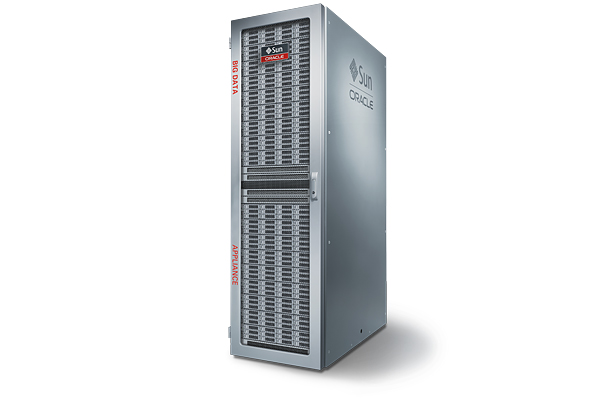 NEWS
NEWS
 NEWS
NEWS
 NEWS
NEWS
![]() Big Data in itself does not always necessitate big hardware, but more often than not, the long-term storage and processing of big data requires hardware that can carry the workload. Many server hardware manufacturers have created specially-configured machines that are designed to handle big data, and a recent survey by Pacific Crest Securities revealed that CIOs preferred DataDirect Networks (DDN) over many other big data hardware suppliers. Nevertheless, several other suppliers of big data hardware are also worth considering.
Big Data in itself does not always necessitate big hardware, but more often than not, the long-term storage and processing of big data requires hardware that can carry the workload. Many server hardware manufacturers have created specially-configured machines that are designed to handle big data, and a recent survey by Pacific Crest Securities revealed that CIOs preferred DataDirect Networks (DDN) over many other big data hardware suppliers. Nevertheless, several other suppliers of big data hardware are also worth considering.
While a survey by an investment banking firm may shed some light on the market trends, it will likely not be a sufficient indicator of the best big data hardware for your organization. Like any major IT purchase, the selection criteria should be based on an individual company’s needs, focusing on critical functionality rather than the overall number of features or flashy presentations that vendors may present to you.
Instead, you should start with a clear set of goals in mind. What does your business hope to achieve and how will this technology make it happen? You can then better determine which vendors are able to provide technology that can meet those goals, those that are unable, and those that attempt to sell additional expensive features that are ultimately superfluous.
Rather than tell you which big data supplier to choose, this brief guide will give you an overview of each, based on the descriptions provided on the company’s own website. This should at least provide you with a starting point from which you can perform more thorough evaluations and make an education decision.
EMC
EMC Isilon – Isilon is a whole division of EMC that deals with big data storage. Solutions include scale-out NAS options, consolidation of data sets, and shared application and resource management. Everything with Isilon scales to meet growing needs.
EMC Atmos (Cloud storage) – For those looking to break out of traditional on-premise big data management, Atmos provides a single storage system for private, public, or hybrid cloud environments. This is storage-as-a-service (STaaS): scalable, value-based automation, and easy access from numerous platforms and operating systems.
NetApp
NetApp Open Solution for Hadoop Rack – Ready deploy, NetApp’s Open Solution is designed to be an enterprise-grade Hadoop stack that can scale while still being affordable. It provides big data analytics, Hadoop name node metadata protection, disk failure detection, online repair, and reduced server-replication.
DataDirect Networks
DDN Storage Appliances – The EXAScaler, GRIDScaler, NAS Scaler, and xSTREAMScaler all feature high-availability services, metadata replication, intelligent data migration, and cross-platform client access. Each customer is matched with the ideal DDN File System and DDN Storage Engine for optimal performance, capacity, and scalability.
Dell
Dell DX Object Storage Platform – From a few terabytes to multiple petabytes, Dell’s Object Storage Platform is designed to be scalable, accessible through multiple file protocols, self-managing, and self-healing. It includes support for variable-sized data objects and metadata, policy-based management, and high compression/fast rehydration.
Oracle
Oracle Big Data Appliance – Oracle’s entry into the big data hardware market is designed to make it easier to access and organize unstructured data. Each appliance features a “pre-integrated” rack with 18 Oracle servers. It also features Cloudera’s distribution of Apache Hadoop, Oracle’s NoSQL Database Community Edition, Oracle Linux, and Oracle Java Hotspot VM.
HP
Autonomy appliance – HP’s Autonomy Appliance combines HP Converged Infrastructure (HP ProLiant servers and HP Storage) with Autonomy Intelligent Data Operating Layer (IDOL). Features include archiving (automatic ingests, duplication, indexing, and metadata extraction), eDiscovery (collection, processing, analysis, review, and production), Enterprise Search Appliance, and HP Converged Infrastructure (integration with real-world applications for easier use in actual business processes).
Just like purchasing a car, you should consider the total cost of ownership (TCO) for bundled packages like big data appliances. How much will you ultimately have to spend on support, maintenance, subscription fees (in the case of cloud computing), and software?
Big data is a rapidly developing technology, and a smart business will adopt hardware that is flexible enough to keep up with these rapid changes, while also providing the stability and reliability that business demands. All of the above solutions promise to provide this level of service. It is up to the discerning customer to decide which is best.
Support our mission to keep content open and free by engaging with theCUBE community. Join theCUBE’s Alumni Trust Network, where technology leaders connect, share intelligence and create opportunities.
Founded by tech visionaries John Furrier and Dave Vellante, SiliconANGLE Media has built a dynamic ecosystem of industry-leading digital media brands that reach 15+ million elite tech professionals. Our new proprietary theCUBE AI Video Cloud is breaking ground in audience interaction, leveraging theCUBEai.com neural network to help technology companies make data-driven decisions and stay at the forefront of industry conversations.